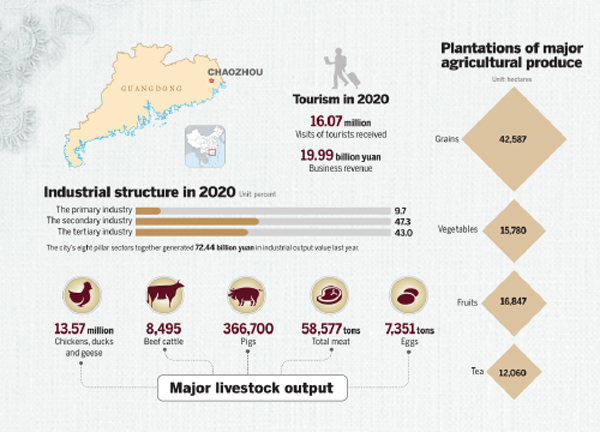Economic focus aims to foster innovation, high-quality growth
City famous for ceramics plans to create new business clusters including modern agriculture and coastal industries
The government of Chaozhou in South China's Guangdong province will be dedicated to building five major industrial clusters in the coming few years. Their aim is to advance the city's industrial foundations and modernize its industrial chains, according to the city's 14th Five-Year Plan (2021-25) and Long-Term Vision for 2035.
It will further implement an innovation-driven strategy to help foster industrial clusters of ceramics, modern agriculture, coastal industries, cultural tourism and emergency response industry. Their formulation and development are bound to bring stronger productivity and competitiveness, which are expected to play a key role in promoting the high-quality development of Chaozhou's economy, the local government said.
Chaozhou is known as China's ceramics capital. The city is home to nearly 6,000 companies producing and selling ceramic goods. It leads the nation in the total export volume of household ceramics, ornate ceramics and architectural and sanitary ceramics, and also ranks first globally in the annual sales of both optical communication ceramics and electronic ceramic wafers.
According to the plan, the city's ceramic industrial cluster will be worth 100 billion yuan ($15.48 billion) by 2025. Chaozhou is to have at least 1,000 ceramic companies above designated size-companies with annual revenue of more than 20 million yuan-and more than 100 nationally recognized high-tech companies in the sector by that time.

To realize these goals, the city plans to curb the scale of sectors with high-energy consumption, high pollution and low efficiency, while paying more attention to intelligent, high-value added and innovative development. Measures to promote technological upgrading, build industrial parks, develop new brands, improve product quality and introduce professionals are to be applied.
In addition to ceramics, the city is vigorously developing and reinforcing its developmental advantages in aquaculture, tea, animal husbandry and agricultural and sideline food processing to foster an industrial cluster of modern agriculture.
Chaozhou encourages large agricultural companies to take the lead in the construction of modern agricultural industrial parks, which can benefit local farmers.
In December last year, for example, a production base started construction at the Chaozhou preserved fruits modern agricultural park as a core project.
The park was mainly established by Guangdong Jiabao Group, with a total investment of more than 200 million yuan. It aims to create a full industrial chain integrating planting, processing, research and marketing of the main raw materials of preserved fruits in Chaozhou. They are tangerines, green plums and chayote.
The planting areas of these raw materials have reached 10,000 hectares in the park, including 6,667 hectares of green plums. This year, the total industrial output value of Chaozhou preserved fruits is expected to reach 5 billion yuan. Also, the park will help at least 12,000 local farmers to increase their income by the end of the year.
Chaozhou currently has five provincial-level agricultural parks, including the preserved fruits park, and is supporting the construction of 10 city-level agricultural parks covering tea, aquatic products, livestock, vegetables and fruits.
Other efforts in cultivating a modern agricultural industrial cluster include supporting the development of new business models, such as agriculture plus cultural tourism and the internet.
With rich ocean resources, Chaozhou is on its way to becoming a modern coastal city. The city's harbor is a natural deep-water harbor, only 192 nautical miles (about 356 kilometers) from Hong Kong, and 186 nautical miles from the port city of Kaohsiung, Taiwan, China.



 Print
Print Mail
Mail

